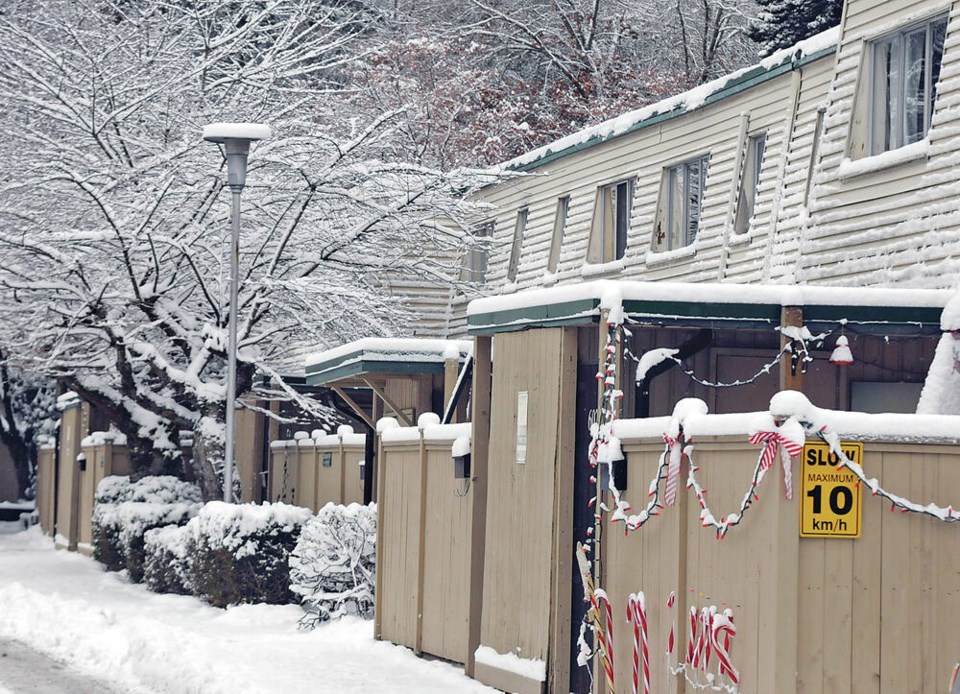For the second time in a decade, a B.C. Supreme Court justice has sided with a group of property owners at North Vancouver’s Cypress Gardens development, who went to court to stop a sale of their entire complex to developers over their objections.
In handing down her decision, the justice wrote that while not approving a sale would mean some owners would lose the potential for larger profits, that interest “is not as weighty as the personal hardship that would be force upon [other owners] should they be forced to sell their homes.”
For April MacKenzie-Moore, a senior who has lived at Cypress Village for 17 years and was one of the residents who opposed the sale, the court decision comes as a huge relief.
“I want to be able to sell my home when I want to sell it, not because somebody tells me I have to sell it so they can make a lot of money,” she said.
When MacKenzie-Moore bought her property in 2005, “It was more affordable than anything else I’d looked at,” she said.
Her unit had more space than others she’d seen, and a view out on to beautiful grounds that just aren’t found in condo developments anymore, she said.
Unusual ownership structure
Another thing that Cypress Gardens has is a very unusual ownership structure, that’s been long since banned by the province.
Originally built as an apartment complex in 1962, the project was converted into a condominium-like ownership arrangement in 1979.
Although it functions essentially like a strata title, Cypress Gardens is legally not set up that way. Instead, it was grandfathered under a “common law condominium” arrangement in which owners buy “shares.” That’s made it especially difficult to determine under what circumstances one group of owners could force a sale on others. In recent years, that’s usually been determined by the courts.
Previous legal fight over Cypress Gardens sale
In the case of Cypress Gardens, a very similar legal fight between owners who wanted to sell to a developer and owners who wanted to remain in their homes played out once already, a decade ago, when another B.C. Supreme Court justice also refused to grant the sale of the property to Polygon Homes for $63 million. That offer was made in 2011.
“I sat through that court case, said MacKenzie-Moore. “I was opposed then.”
In the current legal case, owners who wanted to sell the property petitioned the court to sell to another developer, Strand Holdings Ltd., for $192 million. That offer was put forward in January 2022.
Pro-sale owners cite repairs for aging complex
Among the reasons for wanting the sale, those owners argued that the 20 buildings that make up the complex are nearing the end of their useful lives and will require millions of dollars in repairs in the near future, a cost they said they can’t afford.
Some of those owners told the judge they want to retire and move elsewhere, and selling the property as a whole was the only way to realize the most from their investment.
In reaching her decision, Marzari wrote that while the group of owners in favour of a sale was “considerably larger” than the pro-sale group in 2011, the amount of support for that still fell short.
Number of owners who wanted sale fell short: judge
While Cypress Gardens is not a strata, the group in favour of selling still fell short of the 75 to 80 per cent of owners that would normally be required in comparable strata circumstances, she noted. The “yes” votes in favour of a sale at an extraordinary general meeting of the complex’s management corporation represented 73 per cent of those present, the justice wrote. But she also noted just 56 per cent of the owners had formally petitioned for the lands to be sold.
The judge also expressed concerns about the way the deal had come about. “I agree with many of the respondents that the sale to Strand sought in the petition was not pursued in a transparent manner,” she wrote.
North Vancouver lawyer John Whyte, who represented MacKenzie-Moore and 17 of the other owners opposed to the sale, said those owners are “extraordinarily relieved” by the court decision.
“We’re talking about people’s futures,” he said. “They’re relieved their lives aren’t going to be upended by this decision.”
Cypress Garden is ‘the missing middle’
“Cypress Gardens is the missing middle,” said Whyte. The case, he said, involved many of the same conflicts as we see region-wide, including the skyrocketing cost of housing for middle-class families and the displacement of those people in favour of investors.
Many of the owners he represented were older people, who were on fixed incomes and wouldn’t likely qualify for a mortgage if they had to move, he said. Many are immigrants who “have worked hard to be able to get at least a foot on the real estate ladder.” Others are families whose kids go to schools nearby, he said.
In her decision, Marzari wrote that a court ordered sale would mean a loss of a home “that is not replaceable” for many owners, because “there is a lack of comparable alternative housing within their financial means …"
“It’s a real community,” said MacKenzie-Moore of the resident owners she’s friends with at Cypress Gardens. “Those people stood to lose a lot.”




